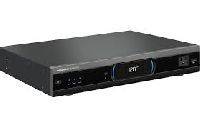
power line conditioner
power line conditioner) is a device intended to improve the quality of the power that is delivered to electrical load equipment. Like: UPS, Inverter, Servo Stabilizer, Automatic Voltage Stabilizer, Constant Voltage Stabilizer, Etc. While there is no official definition of a power conditioner, the term most often refers to a device that acts in one or more ways to deliver a voltage of the proper level and characteristics to enable load equipment to function properly. In some uses, power conditioner refers to a voltage regulator with at least one other function to improve power quality (e.g. pow
...more
Line Conditioner
A power conditioner (also known as a line conditioner or power line conditioner) is a device intended to improve the quality of the power that is delivered to electrical load equipment. Like: UPS, Inverter, Servo Stabilizer, Automatic Voltage Stabilizer, Constant Voltage Stabilizer, Etc. While there is no official definition of a power conditioner, the term most often refers to a device that acts in one or more ways to deliver a voltage of the proper level and characteristics to enable load equipment to function properly. In some uses, power conditioner refers to a voltage regulator with at least one other function to improve power quality (e.g. power factor correction, noise suppression, transient impulse protection, etc.)
...more
High Voltage Power Cable
A cable includes a conductor and insulation, and is suitable for being run underground or underwater. This is in contrast to a conductor, which does not have insulation. High-voltage cables of differing types have a variety of applications in instruments, ignition systems, and AC and DC power transmission. In all applications, the insulation of the cable must not deteriorate due to the high-voltage stress, ozone produced by electric discharges in air, or tracking. The cable system must prevent contact of the high-voltage conductor with other objects or persons, and must contain and control leakage current. Cable joints and terminals must be designed to control the high-voltage stress to prevent breakdown of the insulation. Often a high-voltage cable will have a metallic shield layer over the insulation, connected to the ground and designed to equalize the dielectric stress on the insulation layer. And Low-Voltage Cables
...more
High Voltage Cables
A high-voltage cable (HV cable) is a cable used for electric power transmission at high voltage. A cable includes a conductor and insulation, and is suitable for being run underground or underwater. This is in contrast to a conductor, which does not have insulation. High-voltage cables of differing types have a variety of applications in instruments, ignition systems, and AC and DC power transmission. In all applications, the insulation of the cable must not deteriorate due to the high-voltage stress, ozone produced by electric discharges in air, or tracking. The cable system must prevent contact of the high-voltage conductor with other objects or persons, and must contain and control leakage current. Cable joints and terminals must be designed to control the high-voltage stress to prevent breakdown of the insulation. Often a high-voltage cable will have a metallic shield layer over the insulation, connected to the ground and designed to equalize the dielectric stress on the insulation layer. And Low-Voltage Cables
...moreBe first to Rate
Rate This